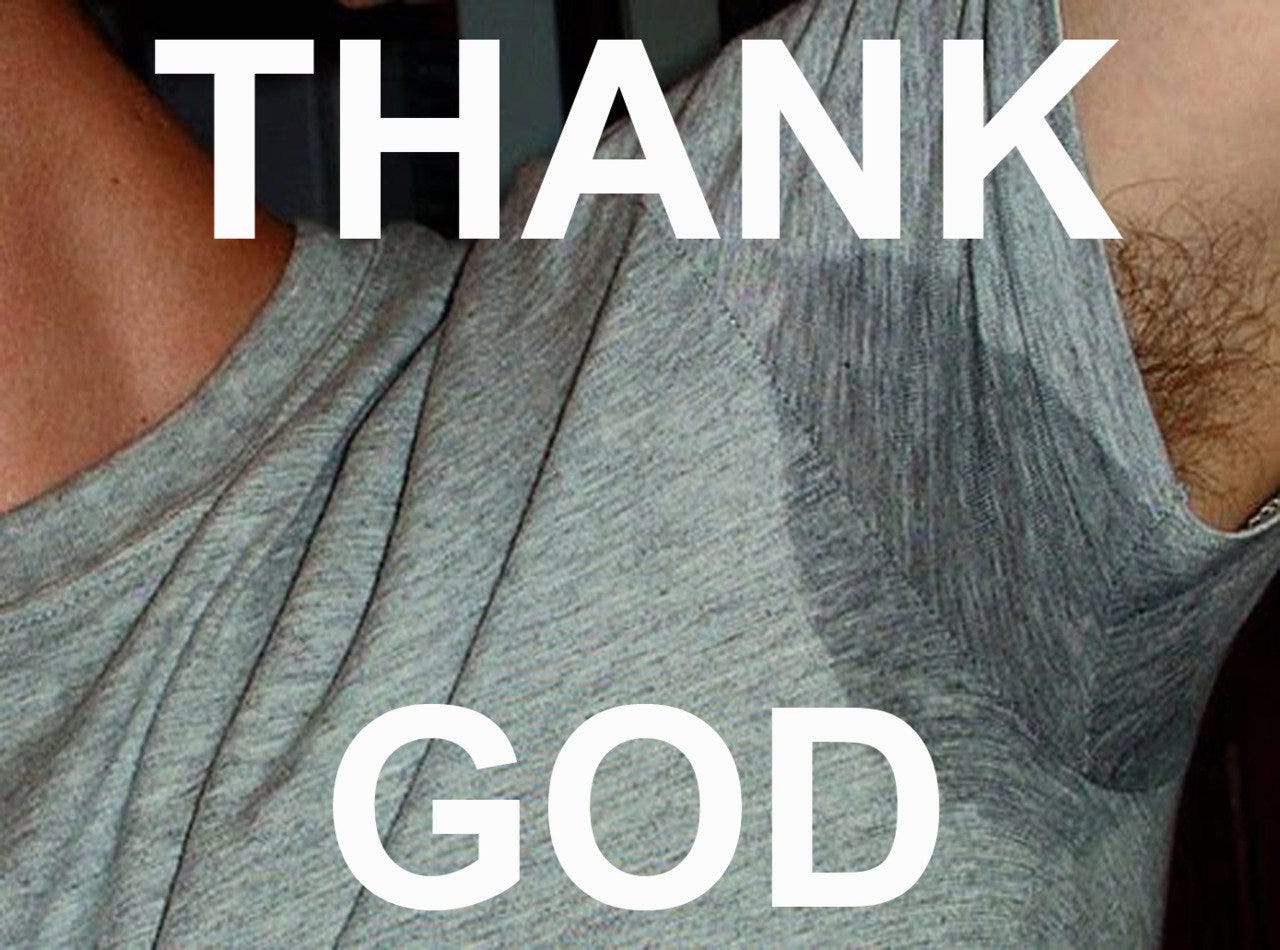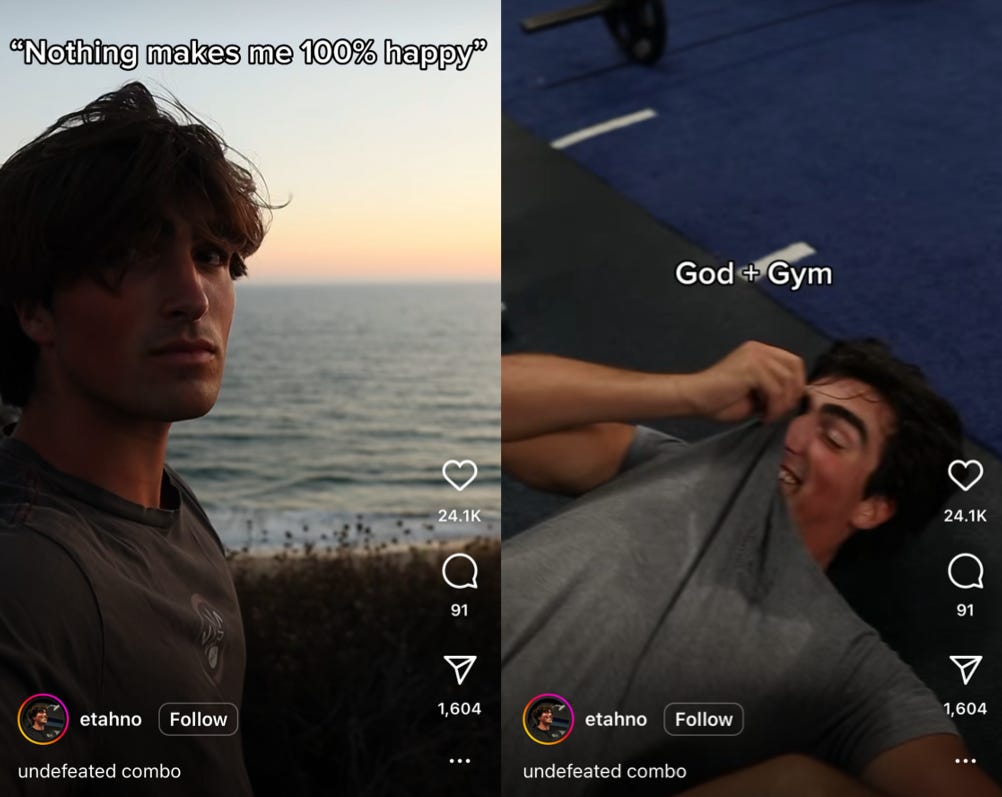
Messages from GymTok
This sh*t really started with secretly doing push ups in our room
focus on yourself bro
It takes a very strong person to sit with themselves and calm their own storms
When you’ve spent the past 3 years training to be an absolute weapon, just to realise you have no enemies
Please change and grow as a person.
The God of the Weight Room

Call them what you will—grindset guys, gym bros, sigma males—but they like to list activities and practices you should engage in. Some go further and give certain mindset advice. Between these points—behavior and belief—you see a lot of Christianity: read the Bible, pray, be a man of God. You see it all over 4chan too. Like a detective, I keep asking myself, Why does God come up so much in this context? Is God just a precondition for the trad life? A moral posture? Just another form of internal strength one should strive for?
Yeah, the last one’s probably it.
But if you want my blunt opinion, I think that Jesus is just Goku for white guys.
Post-villain arc

Beyond the strictly Christian context, a sort of spiritualism is at play in gym culture, however hammily framed: “Skip the villain arc bro / you have no enemies.” To be clear, the villain arc is just the male version of a Reputation Era, and the overall sentiment of “you have no enemies” is basically tenderqueer shit for straight men. But I suppose that any off-ramp from nihilism is a good one. You could do a lot worse than telling an average twenty-something guy to chill out. Especially about their “demons” and “enemies”—antagonists in some sort of Christian or fantasy narrative—and find a less hysterical narrative, a more forgiving one, to insert themselves into.
Throughout this series, I keep returning to this idea of narrative. When all collective narratives seem to end in doom, we search for individual ones to create meaning from the absurdity of existence. Strength, in theory, should resist narrative. It’s an algorithmic pursuit: it repeats and varies in intensity, but has no structure or conclusion because you can always become stronger. But as I’ve tried to show over this series, lifting has adopted, or at least fits into, narrative structures: a coming-of-age narrative, a gender initiation narrative, a trauma narrative, a political narrative, a revenge narrative, a redemption narrative. These narratives hedge against the feeling of meaningless by securing a role for individual agency. Regardless to whether you choose to be the “main character” or the “villain,” you have already chosen not to be the passive victim. You choose strength.
Our moment, exacerbated by social media, seems to exemplify Ivan Karamazov’s moral fear about the universe: that everything is permitted. I come back to this phrase, because I think it inverts how n e o l i b e r a l i s m , thanks to Mark Fisher, is commonly framed: that nothing is possible. The felt truth emerges in the torsion between these points: everything is permitted and nothing is possible. If you hold out—for hope, for virtue, for meaning, for love, for family—you eventually feel like a chump, because your only real options on an individual level seem to be pursuing hollow libertinism or pointless asceticism. Even should you attempt a third way, neither the universe nor “society,” such as it remains, will affirm your way of life as the correct one. You have to find someone to rage against to exercise your feeling of being a chump. There can seem to be no serenity in living by a code—only anger that others don’t follow it and won’t change their ways.
So I think you have to learn to love.
We’re all gonna make it.
Is that theory or theology? WAGMI is a surprisingly nice slogan to emerge out of online gym culture—certainly a long way off from the weird sigma male shit. The collective optimism is a nice touch, because there is, fundamentally, no reason for the libertarian ethos of lifting. Consider a line from a GymTok video, “Weekends [are] whe[n] you increase the gap between you and those [who] aren’t even trying.” What gap? What competition are you and I involved in? Maybe it all seems a little silly to me now that I’ve crossed into my thirties. Not too long ago, I saw a guy in his mid-twenties clearly sizing me up and laughed to myself. Dude, I’m not going to steal your girl. Relax. It’s a skill, I think, for men to learn to chill out about/around other men. Some struggle to get there. Including me.
I don’t fully get the deification of Zyzz, a cult of personality among internet lifters who is credited with the WAGMI slogan. There’s a type of optimism I find fetishistic, and to me, Zyzz mostly embodies the nostalgia for a time when the internet felt fun and larger than life. But I do think there’s a certain kind of love that the gym does make possible. As I alluded to in the previous graf, WAGMI reminds me of the work of Freudo-Marxist Erich Fromm on love, summed up (of all people) by Sally Rooney: “To love someone under capitalism, you have to love everyone.” Fromm argues that our typical view of love is that of two objects auspiciously believing that in each other, they have found “the best object available on the market, considering the limitations of their own exchange values.” This framework for love ultimately reduces another person into something that can fulfill our own needs as an object of consumption. Fromm challenges us to see love, instead, as an art or a faculty—“an active concern for the life and growth of that which we love.”
For Fromm, this art is easiest to see and cultivate in brotherly love—think solidarity more than platonic love—because it removes the challenges of sex from learning this skill and teaches us to love without a ROI. Unless we can learn to love everyone—to extend to them “an active concern for [their] life and growth”—we will continue to treat our loved ones as mere objects of our love. “If I truly love one person I love all persons, I love the world, I love life,” Fromm writes. “If I can say to someone else, ‘I love you,’ I must be able to say, ‘I love in you everybody, I love through you the world, I love in you also myself.’”
Of course, it’s easy to write beautifully about love, but it’s far more difficult to treat it as a skill. And yet, sometimes I do feel it, this feeling of solidarity, when I’m at the gym surrounded by people I do not know living lives I neither understand nor might even respect, pursuing goals or not pursuing them, aspiring to grow or just going about the motions at five o’clock. I’m no better or worse than them; I’m just one of them, lifting the weights I can and always trying again. This feeling isn’t always easy to come by. I’m usually pissed at people hogging equipment or filming themselves for TikTok. But I worry that without love, we atrophy into a “main character versus NPCs” dynamic. And so I try to love them. To wish them strength and resolve. To believe that if I’m going to make it, we’re all going to have to make it.
Thereof one must be silent.
It’s hard to write about that feeling of gym solidarity—maybe it’s just a rush of endorphins. It’s also hard to write about the humor of gym culture, the joy of the lingo, the self-amusement at a douchey selfie, the generosity of strangers in the locker room who will piss in your mouth so you can absorb their excess preworkout when you forget yours, the primal thrill of a PR, the ability to see yourself as beautiful, the freedom not to take things so seriously. A gym theory defeats the point.
Potential suicides
In a previous post, I wrote dismissively about what poet Charles Bukowski calls “potential suicides.” This time, I’ll copy-and-paste the full passage from More Notes of a Dirty Old Man. It reads like something you’ve probably seen online hundreds of times:
It’s a world, it’s a world of potential suicides, well, I speak mostly of the United States, I don’t know the rest, but it’s a place of potential and actual suicides and hundreds and thousands of lonely women, women just aching for companionship, and then there are the men, going mad, masturbating, dreaming, hundreds and thousands of men going mad for sex or love or anything, and meanwhile, all these people, the love-lost, the sex-lost, the suicide-driven, they’re all working these dull soul-sucking jobs that twist their faces like rotten lemons and pinch their spirits, out, out, out... Somewhere in the structure of our society it is impossible for these people to contact each other. Churches, dances, parties only seem to push them further apart, and the dating clubs, the Computer Love Machines only destroy more and more a naturalness that should have been; a naturalness that has somehow been crushed and seems to remain crushed forever in our present method of living (dying). See them put on their bright clothes and get into their new cars and roar off to NOWHERE. It’s all an outside maneuver and the contact is missed.
When I was in college, I used to think that this passage said everything there was to say about modern life. It touches on something real, to be sure. But you can’t live believing you’re just a potential suicide in a vast system of despair and impossibility. This atomized state of affairs isn’t an individual choice, but it is a challenge to try to overcome.
The reason why I won’t kill myself is very simple: all the reasons I currently have to kill myself are the same as they were five, maybe close to ten, years ago, so it’s bad faith for me to say that I can’t live with them because clearly I can. Once you’re five or ten years past the point when you would have killed yourself if you were going to, you have to be honest with yourself that you’re committed to this bitch and have to let the hostage go and figure it out, even if it feels stupid and miserable sometimes. Call it the sunk cost fallacy. Of course, it’d be better to have a real drive to live, not just resignation to being alive, but that can come later. Sisyphus smiles; it doesn’t mean he’s happy.
Bukowski misses in this passage what he perceives at other times in his endless torrents of poetry and prose: that beauty may not be redemptive, but it’s a pretty damn good reason to live. I don’t put much stock into Bukowski. These days, I’m more taken by Kiese Laymon’s ethical principle. In the preface to his first essay collection, he recounts a fight one snowy evening in New York when a friend accused him of becoming the sort of person he hates. Alone and angry, Laymon realized, I’ve been slowly killing myself and others close to me. The line suckerpunched me when I first read it and I continue to reel from it, because it seems like slowly killing myself and others is all I do. For Laymon, you can try to help it, but you can’t stop it. Slowly killing yourself and others is a side-effect of being alive.
But Laymon is decent enough to point to the way out: the task is to bring yourself and others back to life. That’s what art, what effort, what love should always lead to. I go to the gym, because it makes me feel more alive, or brought back to life, in some basic way to exert myself, be around beautiful men, and revolt against the pull of nihilism. If there’s a narrative in lifting for me, it’s The Myth of Sisyphus, this existential triumph over suicide, broadly understood, all the ways we die and hurt each other. To engage the absurdity is to feel alive, and there is something fundamentally absurd about lifting: pointless, repetitive, and endless. But there’s something thrilling there too. Something joyous. Something to live for. And so I live for it.
Coda
Throughout writing this piece, I have combated the urge to torpedo my own analysis. I think we always risk taking the internet too seriously. The problem is that we don’t know what the internet means, so we can’t take it seriously in the right ways. We can dismiss certain behaviors as gaming the algorithm, recreating memes, or finding an excuse to post thirst traps, but at the same time, as I’ve attempted to show, you can see these pieces, however cynical in their shape, begin to cohere into almost an ideology of strength, inviting a kind of immanent critique that might be foolish to apply in the first place. Such analysis is the most decadent strain of academic research—a queer decolonial reading of laundry detergent—and so, as a matter of shame, I’ll remind both you and myself that the goal of this essay was ultimately to create food for thought during a winter bulk.
💪,
Daniel
*
Full Gym Theory series: Preface, Transformations, Death Drive, Post-Sexuality, Jock Oppression




I really liked this too. You wrote well, made me feel moved, and spoke to something that seems true- what else is there?
Look forward to whatever you put out in future!
I really liked this series and I’m stoked for whatever is coming next